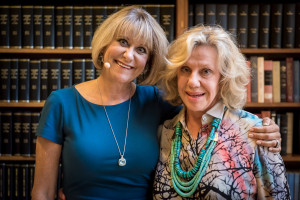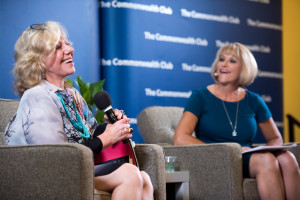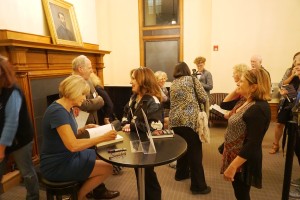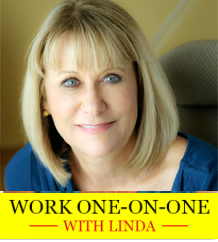
Photo: John Zipperer
Last week, as some of you will remember from the invitation I sent out, I was lucky enough to be “in conversation with” author Erica Jong, just as the last newsletter was going out. It was an evening event with a best-selling novelist who also just happens to be one of the friends I most look up to. As I got dressed before the drive to San Francisco through the commuter traffic, I reflected on how fortunate I was to be participating in this—in spite of my inevitable jitters—and remembered my first meeting with Erica at a reading for one of her many books some twenty-odd years ago. I was a “middle-aged” and yet still-struggling memoirist, and she a blockbuster author, who had burned up the ground with her first novel, Fear of Flying, at a time when I was only a sophomore at Harvard, writing poetry and short stories for college-level prizes.
Despite our very different professional levels, she immediately took me under her wing from that first encounter onward, showing me, over time, the publishing industry’s political side, complete with guidance up the ropes I had never even known were there to climb. It was an honor to be asked to moderate the event in San Francisco, which would celebrate the publication of her newest novel, and to give back to one who had given to me so fully and freely.
The success of the program was due to Erica herself—bouncy, irreverent, sexy at seventy, wholly herself and pulling no punches when asked tough questions. She is one of my favorite writers because she always looks deeply into herself as she writes about life in general; this quality is one that, I hope, also characterizes my own work. In the end, I believe we have much in common.

Photo: John Zipperer
LISTEN TO MY CONVERSATION WITH ERICA JONG BELOW!
And, to my delight, she is also an avid dog lover, mother to a Standard Poodle whom she adores and walks dutifully through rain, sleet and snow from her city apartment. She allowed me to use her wonderful comment about Bespotted on the cover of the paperback edition, and has continued to be a very generous friend since our first meeting that night so long ago.

I believe that to be a mentor to a younger author is one of the finest things a more established writer can do for one who has yet to become so, and I try to keep Erica’s example always in mind. Recently, when asked by a friend to help with the memoir of her best friend’s son, I agreed. The time spent with him took me away from my own work, but even though those hours were lost, I gained something invaluable.
Having taught courses and participated in workshops many years before, but then having moved away from that part of the writing life, I rediscovered the joy in working with another person. This is, in part, what led me to start up my consulting services for those who want to begin writing, or who already write but need help. As I knew so well myself, there are often young, or inexperienced, writers out there who just need the counsel of an author who’s been around for a while. Why not do something you love, alongside something else you love?
Inevitably, there are those with whom one has no connection at all, who ask for help “off the books.” As I am typing this I have received an email from a young woman I don’t know, who has self-published a memoir about her years of sexual abuse at the hands of her mother, something with which I can identify. For publicity purposes, she needs a blurb. At dinner the other night, I met an eighty-eight year old woman who has just self-published a lengthy memoir about her childhood in Appalachia, and for her next book, she, too, needs a blurb. Already on my desk is a manuscript from a woman who served in the Israeli Defense Forces, and she needs a blurb, as well. There is no reciprocity involved in providing these particular comments, because I would ask none of these three women for a similar favor. These are, in fact, straightforward freebies.
I understand this blurb business all too well. Such positive comments fill the backs of book jackets and often make other people want to read the works they grace. But blurbs are hard to come by, and thus one writer asks another writer, and sometimes gets lucky—lucky because one’s friends and compatriots are not only busy, (and the more recognized and successful they get, the busier they become), but many are only willing to offer praise, quite understandably, where praise is due. I myself set a limit: I must read the book and like it before I offer a blurb that can be quoted on the jacket.
Yet, I find myself in just this same position as each one of my books come out and I, in turn, ask others for their imprimatur. I hate the process of imposing upon others in this way, asking them to give up time with their own work to read what I have written—but this is how the industry works. And I well know that, as the old saying goes, what goes around comes around.
One week ago today was Yom Kippur, the Jewish “Day of Atonement,” a serious time of reflection that closes the holiday cycle of bringing (not ringing) in a new year, as the Hebrew calendar is different from the Christian. At services this year, the thrust to the rabbi’s sermon was that each of us should not simply confess our past sins and seek forgiveness, (day of atonement), but should begin the new year with a new attitude: the resolution to help others, in whatever way may be appropriate for you—even when no credit is given, and no advantage gained. That proffered help can be cooking at the soup kitchen or bringing a new writer into the world: whatever you have to offer as an act of t’sedekah, the Hebrew word which means charity, or, tikkun olam, which means helping to mend the world.
It all has very little to do with money and everything to do with heart. This is why I love the three and a half-hour service on the morning of Yom Kippur. It draws me out of myself. I am able to take the time to listen to music of extraordinary beauty and to reflect upon what I have done with my life in the past year, as well as what I can do with the one to come. I contemplate the picture of my life and decide how this new year will be different from the last. And so, last night, I thought hard about these three new writers who have all asked me for the gift of my time.
Just as Erica once extended her hand to me, it is my turn to extend my hand to them, and so I will read their books. Who knows what I may find in all those many pages? Perhaps prose and ideas both impressive and strong. I will offer these three any help I can give, be it the words of praise they seek, or just my emotional support, if praise cannot be my honest response. And in this way, I discover a particular kind of pleasure as I make my small and humble contribution to tikkun olam—one word at a time.
Yours,
Linda
LISTEN TO MY CONVERSATION WITH ERICA JONG BELOW!
Have a comment or feedback? Talk to Linda!

